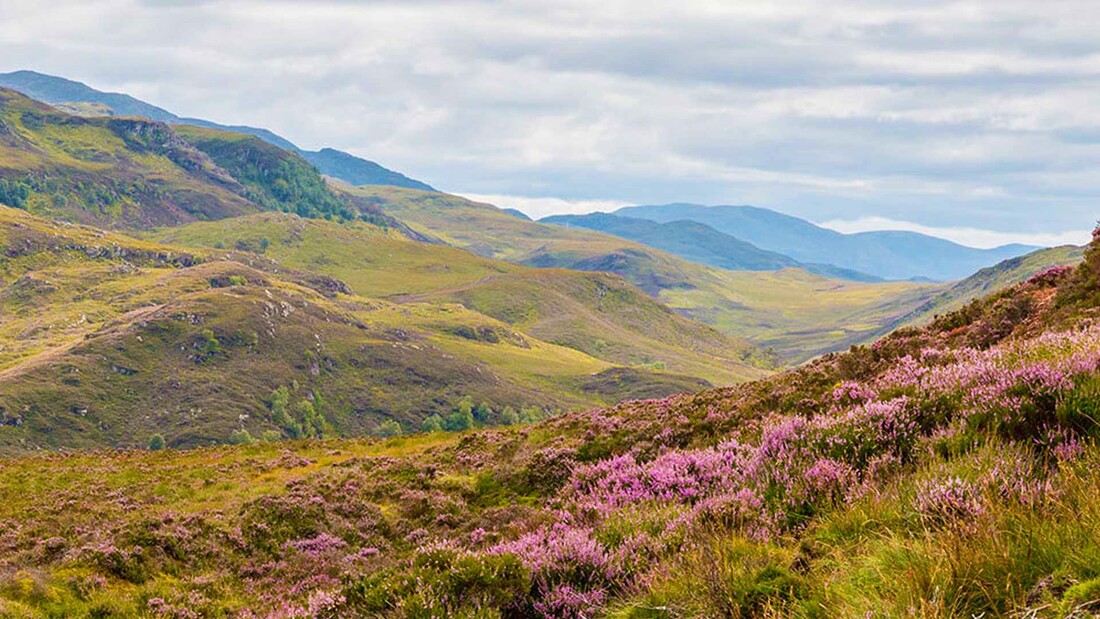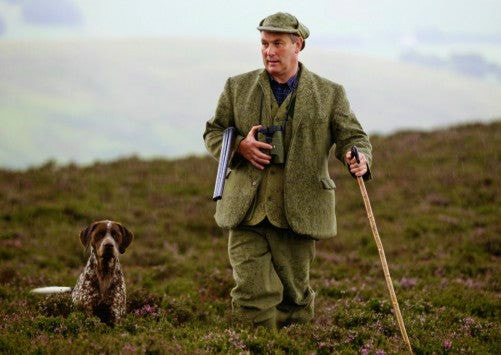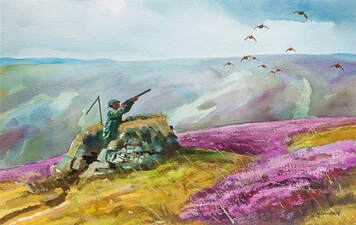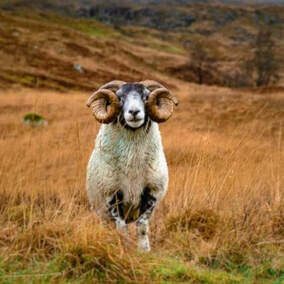The ’Keeper wi the Lauch by Ronald Mackay
(That’s in my native Scots. In English it is: The Gamekeeper with the Laugh)
“The shoot’s over. Send the beaters home.” The head ’keeper turned to supervise the day’s count of gamebirds and animals.
We beaters, who walked the moors in a mile-long sweeping noisy line to drive the coveys of grouse towards the guns, could return to our accommodation. It was a bothy provided free by the Laird of Spittal during the early grouse season. We, mostly students on vacation from university, were intent on earning to contribute to our expenses when the semester resumed in October.
“Follow me, lads!” The ’keeper who had. in the early chill of that glorious 12th of August 1963 introduced himself to us as Willie Bogle, struck out over the featureless moor to guide us to our lodgings. We’d beat well over 20 steep miles on an estate of over 100,000 acres. The guns travelled back to the lodge in Land Rovers. Exhausted, silent, we followed Willie on foot over a treeless grouse-moor, purple with heather.
**********
“I’ll hae a gless o water.” Willie entered the stone bothy, our temporary home.
“There’s beer,” offered one of the more generous students.
“Water’ll dae fine.” Willie filled a cup from the tap and sat down. Some screwed the tops off dark bottles of McEwan’s Pale Ale.
“How come all you gamekeepers wear the same fancy dress?” The provocation, in the regional accent of northern England, came from an older post-graduate student.
Wille erupted in a blast of laughter. For that signature bark, he was known throughout the Grampians as ‘The Keeper wi’ the Lauch’. Once heard, never forgotten.
“Your name?” Willie asked when he’d caught his breath, his sharp eye on the provocateur.
“Tom.”
Willie’s smile was steady but his eyes told he’d registered the sarcastic reference to the clothes worn by all gamekeepers on the estate -- identical rough-spun, Harris Tweed jackets the colours of the grouse-moor, plus-fours buckled above lovat-green stockings and half-sprung, leather brogues to grip steep hillsides.
“So, Willie, what’s the monkey-suit all about?” The student’s English accent contrasted with Willie’s Scots.
Eyes on the interrogator, Willie drew on his water as if to erase the affront. Then he switched from Scots to match Tom’s Standard English.
“What’s this all about?” He doffed the Harris Tweed deer-stalker cap and examined the warm, patterned shades. “This is the traditional estate tweed o’ Spittal.”
“They make you serfs dress alike?” The speaker was probing for a nerve.
“It’s a tradition in the Highlands. Estates with a grouse moor, a deer forest and salmon streams have their own Harris Tweed. Keepers wear it. The Laird and his family wear it. Part for camouflage, part to show pride.”
“Pride?” Tom’s lip curled.
“Pride!” Willie affirmed. “Pride in our belonging, in our togetherness.”
“You mean to show who you belong to?”
Willie exploded into another laugh but his eyes never left the student’s face.
“Belong? We aa belong somewhere, aye, and to someone. I was a stalker and a ghillie, first at Auch then at Quoich till ‘39. Back from the War, I’ve rented myself out, like. Independent. A dozen estates seek me. The grouse, the ptarmigan, the stags, then the hinds. There’s the culling and the heather-burning. The salmon. I’m here at Spittal for the early weeks of the grouse. The odd day’s deer-stalking with a guest. Here, I’m proud to wear the Spittal tweeds.” He paused, winked. “Saves wearin oot my own!” As if to underline his joke, Willie erupted into laughter.
“Independent, you say? Absentee landlords and rich London toffs pay you bugger-all to do their bidding if and when it suits them.”
Willie’s tone remained even though his eyes seemed to measure the very soul of his provoker. “The landowners, toffs you say, but lairds for generations, pay my fee. I take what suits me.”
“Exploitation!” The student was annoyed at Willie’s composure. “A working life away from home. Here, there and every-bloody-where! Your wife approve?”
Willie played with the cap in his hands, smiled, exploded into a barking laugh then wiped his eyes. “Ma wife? Ma wife’s used to ma ways. She aye cries me,” and he smiled at the thought, “she cries me a raikin’ tink, a traivellin hoor!” He burst into a great laugh as if his wife’s description of him as a wandering pedlar, an itinerant whore was a source of humour.
Tom and other students from England, unfamiliar with the dialect, looked puzzled. I translated and they laughed:
Willie, a wandering pedlar, a peripatetic whore!
“Would you be a student o’ politics maybe?’ Willie addressed Tom.
“Political History. European; 20th century. Doing my doctorate with Professor Hobsbawm at Birkbeck.”
“An just wha would Hobsbum o’ Birkbeck be?” Willie’s eyes twinkled.
“Erik Hobsbawm,” Tom corrected. “Hobsbawm’s only the most respected Marxist thinker in the country.” His tone challenged contradiction.
“Marxism’s a theory, is it no?” Willie scratched his head as if chasing a long-forgotten fact.
“Marxism’s only the theory that explains why we plebs are walking the hills to drive grouse onto the guns of toffs from London for a capitalist landowner. Only the theory that explains how the bourgeoisie force us to work for bugger-all and live in this shite-hole while they’re at the lodge drinking champagne.”
Willie finished his water slowly. “Well, I’m grateful to you.” He stood up and ran his mug under the tap. He smiled to us and was gone.
We beaters set about making supper. Tom, the doctoral student of Marxism from Birkbeck, pulled two grouse from inside his baggy jacket. “See? I’m gonna eat like these bastard toffs at the lodge.”
There was nervous laughter. To pick up a grouse was forbidden. Labrador-retrievers served that purpose. For a beater to possess a grouse was tantamount to theft.
**********
Come the weekend, I was alone in the bothy. The others had headed home or to meet friends working in the seasonal hotels of Braemar and Aberdeen.
On a walk, I fell in with Willie. He had a subtle way of finding out about a person without appearing overly-curious. He learned that I was a Scot from Angus. I could speak a dialect similar to his own. I had nowhere to go at weekends and was content with my own company. I was not yet a student but had spent two years working since leaving school. Paying jobs first in the sunlit banana plantations on the island of Tenerife, then deep in the bowels of Ben Cruachan, helping excavate the miles of tunnels that served the pumped-storage hydro-electric power station based on the Snowy Mountains Scheme in Australia.
My status as a plantation worker, a tunneller inside the legendary Cruachan and especially my rank of not-quite-yet-university-student, appealed to Willie.
“A’ll learn ye how tae get a hare for yer supper.”
For the rest of the afternoon he showed me how to successfully set a braided brass-wire snare on a bare hillside to kill a running mountain hare instantaneously.
In his quiet way, Willie taught me about the Scottish Highland estate. Nature manages itself, he let me know without ever repeating himself, in ways that satisfy the needs of the animals whose natural home it is. The predated-upon evade or fail to evade the predators. An equilibrium is reached. Golden eagles, ravens, hooded crows and foxes are predators; mountain hares, rabbits, ageing deer, old ewes and even lambs are the prey. The passing of the wolf made the culling of the Red Deer necessary and helped finance great estates. The gamekeeper’s job included the duties of deer-stalker, salmon-ghillie and protector of grouse and ptarmigan. Together, the varied tasks combined to assure a balance. Weaker stags were culled, controlled burning encouraged fresh heather that provided tender shoots for grouse and grass meadows for black-face sheep. Such balance assured paying guests weeks of demanding shooting and fishing. In this way, the estate, its moors, its grand lodge, its scattered bothies and the access tracks across miles of desolate hills and bridges over tumbling streams, could be maintained and the land preserved as it had been for centuries.
**********
One evening the following week, Willie accompanied us back to the bothy from a long and difficult beat so that we wouldn’t get lost. As before, he sat down with a mug of water and Tom once more took up his self-appointed task of trying to provoke Willie.
Tom talked of how injustice was the foundation the Highland estate; that we workers must repudiate absentee landowners and their corrupt institutions; how inherited privilege supported exploitation and inequality; how the Laird was humiliating us by making us walk the moors for a measly £2 a day to satisfy the appetites of his bloodthirsty toffee-nosed guests.
Willies weekly visits persisted. Because Willie listened serenely, often laughed, thanked us and left, Tom tried harder to hit the bull’s eye. He talked of how estate workers like the ’keepers, stalkers and gillies were no better than 18th century Russian serfs; how Britain’s workers had emerged from the War with losses but no gains; how a vague ‘we’ must take revenge on the bourgeois capitalists who had tricked us into the war; how the real heroes of our time were Kim Philby and his like – who bravely repudiate the country they were born into along with its traditions and values.
But Willy continued simply to listen, laugh and then leave after he thanked us.
**********
One Friday evening, Willie invited me to accompany him. “The Laird needs a salmon for tomorrow’s dinner with his guests. Our job’s to catch him one.” He carried a split-cane fly-rod.
“Here’s the pool.” Willie and I stood in the short heather looking into the dark water. The wide stream, whisky-amber from the scattered peat-bogs, spilled over rocks to tumble down into the glen. Bright scarlet Rowans hung over the opposite, higher side making casting impossible.
The great salmon lay in the brackish deep, gills pulsating. He refused to acknowledge the variety of flies that Willie’s accurate casting coaxed by his hooked jaws.
After a fruitless half-hour, Willie reeled in his line. “Sunrise tomorrow. We’ll get him.”
The following morning, we returned without the rod. Still, the great fish rested on the bottom of the pool, head into the current.
Willie picked up a flat rock and threw it into the middle of the pool with a great splash. The salmon disappeared. Willie took off his jacket, waistcoat and tie then rolled up his sleeves. Lying down on the bank he stretched his arms under the overhang and into the water. His body jerked and his shoulders contracted. With a smooth roll and a flip, he cast the salmon over his back to land in the heather where it could not spring back into the stream. Willie removed a priest – a short club – from his ‘poacher’s pocket’ and dispatched the salmon with one blow.
“There’s aye a way!” He laughed. Willie was a man who found a solution to every challenge.
As we walked back to the lodge to deliver the 25-pound salmon to the cook, Willie told me of a variety of ways – both legal and illegal – that could be employed to take a salmon.
**********
Weekend after weekend, when the other beaters had left, I learned many country skills from Willie Bogle, the Keeper wi the Lauch.
And for one night each week we listened to Tom pontificate on what he had learned from his Marxist mentor Professor Hobsbawm of Birkbeck College: that the capitalist industrial economy was doomed, that it produced an egregiously unequal society: that the property-less proletariat was the sworn enemy of the bourgeoisie who cornered land and money along with the better things of life that rightfully belonged to the working man.
Invariably, Willie listened with a smile on his face. When he’d finished his water, he stood up, thanked Tom, smiled and left.
**********
As our time as beaters was running out, Tom made a final effort to provoke Willie.
“So, Willie, what do you think?”
“Aboot what?”
“About the things I’ve been saying. Professor Hobsbawm’s history of the working class. The Communist Party. Class war. The need for the exploited to mount a revolution.”
“What do I think of your Hobsbum and his Communists? Ye want to know, Tom?”
“I do!” Tom sensed triumph and grinned.
Willie’s voice was so quiet that we strained to hear.
“From whit I’ve seen, yer average communist’s a resentful man with a double tongue. With his revolution, he does what he can to wreck his inheritance but has nae sense o’ what to put in its place save a bonny picture o’ a Shangri-la that’ll never be.”
We were silent. This was the first response to Tom’s political preaching we’d heard Willie utter.
Immediately, Tom returned to the attack.
“From what you’ve seen? You? Up here on a highland estate owned by a capitalist toff? How does that experience give you the right to come up with a bunch of anti-revolutionary shite like that? You’ve been brain-washed, Wille.” Tom grinned.
Willie threw his head back and released a noisy burst of laughter.
Now, we thought, Willie will rise, thank us politely and leave. But Willie sat stock still. When he finally spoke, his voice was quiet, his eyes on a distant place we innocents could not begin to imagine.
“Experience? You want my experience, Tom? I’ve seen shameless brutality and destruction by your Hobsbum’s communists. If I tellt you the details ye widna sleep for the horror o’ it. Aye, and I’ve listened to their apology that claims the ends justify the means. But, after half a century and more, the workers they rule over live in daily fear and their gulags are burstin’ at the seams.”
“Where could you have seen that?” Tom gestured to the surrounding mountains and moors, incautiously refusing to disguise his derision.
Willie’s smile vanished.
“Where? Me? Ye ask me where I’ve seen that?”
Tom was rocked back in his chair by the challenge in Willie’s voice.
“Ye say ye’re a historian, eh? The 20th century. So you’ll know all about the War?”
“Right.” Tom’s voice was losing some of its certainty.
“You’ll’ve heard of the LRDG then?”
“The Long-Range Desert Group? Fought in North Africa. No communists there! Ha, Willie?”
“Richt you are, Tom. But efter we threw the Gerries out o’ North Africa, ye ken what our platoon did?” He didn’t wait for Tom’s answer. “We parachuted into Yugoslavia. To help the partisans harass the Germans, stop them gettin back to the West too fast, like. Aye, and more than one of our officers and some of our men were born into estates like Auch, and Atholl, Quoich and Spittal. Today, I work, choose to work, for some of these very men – the lucky ones, like me who got to come home wi aa their bits an’ pieces intact. Oh, I know, Tom, to you and your Hobsbum o Birkbeck, they’re toffs. Braw homes in London. Lodges in the Highlands where they shoot grouse, stalk deer and cast fly for the salmon with their friends. They’ll drink champagne or a braw single malt. I do the same myself when I get the chance! But make no mistake, laddie, these are patriots, leaders of men who love tradition, men who’ve never lacked bravery or failed in their loyalty to their country, aye, nor to naebody.”
Tom was quiet now. Willie had earned our fixed attention.
“I helped Yugoslavs no matter who they were. I’ve organised and fought alongside nationalist Chetniks, aye an’ wi communists wha bore no loyalty to anything or anyone except the Party. And what did I see, Tom?” Willie paused. No one spoke. “I saw the Communists strangle the life out of all the beliefs that their communities had lived and loved by – their own country and their own families, their faith, their traditions, aye, very law and order itself. All in the name of your Stalin’s Marxism and your Hobsbum’s communism where there’s no law but what the Party says it is for its own convenience at any given moment.”
Willie paused again.
“I watched the communists create a class war, watched them put down the middle class and degrade, aye and kill, any educated soul who could think for himself – the teacher, the lawyer, the doctor, the businessman -- anybody and everybody who’d striven, studied and showed respect for their country and all that it had stood for, for generations.”
“But the communists won!” Was Tom rallying?
“With Russian help, the communists won.”
“So, class loyalty is stronger than patriotism.”
“In the name of your class loyalty I saw countries -- whole countries -- wiped off the map, joined up by force under a new name like they’d never existed. It’ll no last, Tom! It’ll no last. Marx’s class war’s a handy lie but it canna explain aa the differences that make up this world.”
Willie stopped. The anger that had driven his response to Tom’s goading visibly drained from his face. He smiled again, threw back his head and laughed hard.
No longer was Willie harassing the retreating German Army or watching his back for the sudden communist dagger, he was a Highland gamekeeper at peace with himself, his employers, his family, his country, the entire, complex natural world around him and most of all with his place in this world.
Willie smiled at Tom and then at each of us in turn. He stood up, adjusted his Spittal Estate tweed deerstalker cap as if preparing for inspection.
“I’m grateful to you gentleman, one and all! Ye’ve learnt me a lot in the past four weeks. Aye, and ye’ve given me a lot tae think aboot!”
On his way to the door, he put his hand on my shoulder and winked. Then, straight-backed, Willie marched out into the gloaming as if to the skirl of a lone piper.
I too, thought I could hear the piper.















